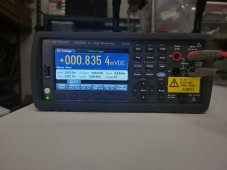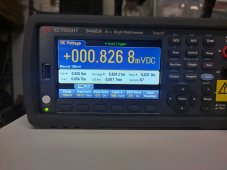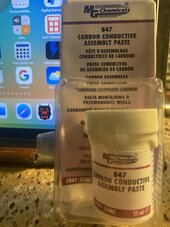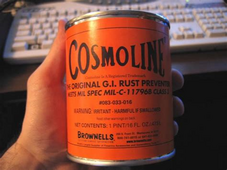Great! How many amps did you test with? Can you test again but tighten the bolt with tools as tight as you can? Makes sense that copper particles would enhance conductivity but I wonder if they make a difference with properly tightened lugs.I measured across a set of 1/4in 2awg lugs bolted together hand tight.
You are using an out of date browser. It may not display this or other websites correctly.
You should upgrade or use an alternative browser.
You should upgrade or use an alternative browser.
Dielectric grease on cable lugs? Lets test!
- Thread starter AntronX
- Start date
zcskywire2
Solar Enthusiast
Yea I can do that.Great! How many amps did you test with? Can you test again but tighten the bolt with tools as tight as you can? Makes sense that copper particles would enhance conductivity but I wonder if they make a difference with properly tightened lugs.
First off though, Power supply was set to 30v 30A, with a read back current of ~29.15A
Went back and torqued the bolt to torqued AF. No grease resistance dropped significantly to 0.835mV. Greased resistance also dropped to 0.826mV. Not much difference in the short term here, but over the long term I am sure it makes a huge difference. Especially with fast rusting metals like 1000 or 1100 series aluminum (Battery Terminals).


LOL I like your torque spec.Went back and torqued the bolt to torqued AF
0.826mV / 29.15A = 28.3 uOhm. That's 2x better than my result.
Boron
New Member
Silicone grease is what it is - insulator. WTF do we call it dielectric grease !!!!!!!!!! It sounds to me like some poisonous marketing mongrels decided to take a $ product and repackage it for $$$. Urban myth now is that its supposed to have conductive properties - like "copper grease" used as an anti seize compound on bolts. It has been shown this Cu grease has no appreciable conductive qualities - but Joe Public is a sucker for anything?
Bottom line is that conductive surfaces clamped together, rely on the micro surface roughness (hills and valleys) to make all those little point contacts that break through surface oxide films that form (very quickly). It also cuts through the thin grease film as well.
Give me a break guys
Bottom line is that conductive surfaces clamped together, rely on the micro surface roughness (hills and valleys) to make all those little point contacts that break through surface oxide films that form (very quickly). It also cuts through the thin grease film as well.
Give me a break guys
This was my test some time ago with MG 847 (Carbon Conductive Paste).

 diysolarforum.com
diysolarforum.com
If someone wants to repeat this with lugs or something...

MG Chemicals 847 Test
I'm posting this as a response to a comment from Paul F. Note: mR == milliOhm. Hypotheses I proposed: MG Chemicals 847 can lower the resistance in a connection between bus bar and battery terminal, especially in cases where limited torque can be exerted, or where the two connections are not...
If someone wants to repeat this with lugs or something...
Good stufff…but messy ..it can get places you haven’t been too yet..This was my test some time ago with MG 847 (Carbon Conductive Paste).

MG Chemicals 847 Test
I'm posting this as a response to a comment from Paul F. Note: mR == milliOhm. Hypotheses I proposed: MG Chemicals 847 can lower the resistance in a connection between bus bar and battery terminal, especially in cases where limited torque can be exerted, or where the two connections are not...diysolarforum.com
If someone wants to repeat this with lugs or something...
Attachments
Silicone grease is what it is - insulator. WTF do we call it dielectric grease !!!!!!!!!! It sounds to me like some poisonous marketing mongrels decided to take a $ product and repackage it for $$$. Urban myth now is that its supposed to have conductive properties - like "copper grease" used as an anti seize compound on bolts. It has been shown this Cu grease has no appreciable conductive qualities - but Joe Public is a sucker for anything?
Bottom line is that conductive surfaces clamped together, rely on the micro surface roughness (hills and valleys) to make all those little point contacts that break through surface oxide films that form (very quickly). It also cuts through the thin grease film as well.
Give me a break guys
Haaa..it has been my experience that arguing about potions or grease or fluids is about like arguing politics - religion - sports… nobody ever wins…!
Having spent many years fighting the effects of corrosion and rust on boat fittings and wiring around salt water I did learn that its a battle you rarely totally win..
On a solar set up , the difference is the amperage ( and voltage)can be much higher than most things
( except an anchor windless) …
I consider where the items are located and it’s environment as to what’s the best stuff to use for that item ….. how I clean , sand , level ,true or prep each fitting to be fastened or joined plays into the decision of what to use …sometime two or three layers of prevention..
I have found that MG corp makes some great stuff for different needs ..but I do not find the silver paste to be user friendly ( at least the tube I got) but does work well if you can actually apply it properly ..
the carbon paste is good for sure ..
Ideal no Alox..works good …
.Sanchem No-OX-ID has done a great job on preventing corrosion and preserving outdoor copper fittings fastened to my steel chassis , and grounding bussbarr.
It’s tinted but almost clear ..you can see everything happening around where it’s protecting ….
Based on actual inspection I always anticipate I have to replace or repair or re- treat most things at some point…way before it fails.
.especially if it’s constantly wet ….or exposed to heat and water …
I love the Deox-it series of cleaners and protectors for intricate and fine electrical stuff…Used it for 25 years ..use it now for some CC and inverter connections and cat 5 type stuff, HDMI connections , smart phone cords and jacks …anything electrical…
excellent product for certain applications….( BTW..it’s 15-20 bucks for a small can)
I just try to get the best product I can and move forward…
I’m always open to learning about new things…
J.
RadioChief
New Member
Pretty interesting thread. I have thought about this but never found anybody that really tested it. I use dielectric grease all the time in electrical panels. Especially helpful when aluminum meets copper. Also down here in the humid south near the gulf coast it helps prevent corrosion build up on connections. So I assume it would be beneficial when preparing lugs on heavy conductors. I've seen only one Youtube video that talked about the practice. I am also sold on Caig DeOxit D5 cleaner. Not cheap but it is good for cleaning the buss bar surface for mating with a lug.
Deoxit D5 rules for about any home office electronic store ,repair shop car ,boat and anything else thst connections, tubes, pots,jack,plugs,ports , ..a single can can service a hundred devices when use properly… if there is somthing better I have never had anyone anywhere tell me about it…Pretty interesting thread. I have thought about this but never found anybody that really tested it. I use dielectric grease all the time in electrical panels. Especially helpful when aluminum meets copper. Also down here in the humid south near the gulf coast it helps prevent corrosion build up on connections. So I assume it would be beneficial when preparing lugs on heavy conductors. I've seen only one Youtube video that talked about the practice. I am also sold on Caig DeOxit D5 cleaner. Not cheap but it is good for cleaning the buss bar surface for mating with a lug.
It’s about 5 level in performance up from those cheap big cans of contact cleaner one buys at a big box store ..
In wouldn’t say this if I didn’t mean it..
J
Boron
New Member
Good User info JR. As you say a lot depends on the environment - and warm marine is the worst.
Maybe a take away here (apart from your preferred grease) is that copper - elec connections need to be cataloged and inspected periodically YMMV on nautical locations. But then so much else afloat needs regular attention as I found when I was a boaty (black hole $$$$).
Maybe a take away here (apart from your preferred grease) is that copper - elec connections need to be cataloged and inspected periodically YMMV on nautical locations. But then so much else afloat needs regular attention as I found when I was a boaty (black hole $$$$).
Good User info JR. As you say a lot depends on the environment - and warm marine is the worst.
Maybe a take away here (apart from your preferred grease) is that copper - elec connections need to be cataloged and inspected periodically YMMV on nautical locations. But then so much else afloat needs regular attention as I found when I was a boaty (black hole $$$$).
I do agree that a schedule of checking or maintence on all kinds of stuff is a good thing…
Especially the stuff that can kill , hurt or cost ya a lot of money.
Could I be better at that task…..Yes…..absolutely…yes.
J.
Boron
New Member
The worst nightmare is fire on board afloat, and electrical connections are a serious culprit (especially if one is a bit slapdash about all that stuff - come on own up). PVC sheathed cable gets hard to handle as it ages (with heat) especially around machinery. Silicone cable is a much better bet and is available in marine for ie tinned wire strands. Lots of silicone grease around exposed metal parts (but not on silicon sheaths).
Last thing you want is electrical fault/lights/engine/insts failure in a force 8 round midnight. Critical systems should be duplicated (run/standby)
Just cos Im paranoid, doesnt make me wrong.
Wow that Deoxit d5 is $$$$. We used Electrolube oil on wire pots, its a few $. I would paint silicone oil (rather than spray - too thin) on electronic edge connectors . I wonder what the Military do?
Last thing you want is electrical fault/lights/engine/insts failure in a force 8 round midnight. Critical systems should be duplicated (run/standby)
Just cos Im paranoid, doesnt make me wrong.
Wow that Deoxit d5 is $$$$. We used Electrolube oil on wire pots, its a few $. I would paint silicone oil (rather than spray - too thin) on electronic edge connectors . I wonder what the Military do?
In the old days of gracious behavior, many fine restaurants would always hand the man a menu with the prices on them…Then they would hand the the” fair lady “ a menu without prices..The worst nightmare is fire on board afloat, and electrical connections are a serious culprit (especially if one is a bit slapdash about all that stuff - come on own up). PVC sheathed cable gets hard to handle as it ages (with heat) especially around machinery. Silicone cable is a much better bet and is available in marine for ie tinned wire strands. Lots of silicone grease around exposed metal parts (but not on silicon sheaths).
Last thing you want is electrical fault/lights/engine/insts failure in a force 8 round midnight. Critical systems should be duplicated (run/standby)
Just cos Im paranoid, doesnt make me wrong.
Wow that Deoxit d5 is $$$$. We used Electrolube oil on wire pots, its a few $. I would paint silicone oil (rather than spray - too thin) on electronic edge connectors . I wonder what the Military do?
As she wasn’t Gona pay anyway.. It took a y oreasure off of her if she ordered somthing pricey…
so she could always say, I didn’t have any idea what it cost…it’s just what I wanted…
I sorta like that,as long as I’m not on the date with her….
That’s how the military does… they don’t know and in this case even care ….they’re not paying…..WE ARE……Deoxit could be 300 dollars a can for them … why do they care…
Good ole working Joe is Gona pay..
Just order some …
It’s not our money..
That’s what the military do….!
robbob2112
Doing more research, mosty harmless
I will test this sort of thing when I dink around with fuses.
A few take aways from life experiences. Silicone spray works well for a lot of things but it is thin and can run and displace in time. Silicone grease also works well however it can thin and migrate with time. Both silicones can soften or break down other things made of silicone like O rings or molded seals. Use synthetic or petroleum grease on silicone. Silicone grease is absolutely the best thing to use when installing rubber impellers, never use petroleum grease on rubber impellers. I hate the term “dielectric grease” probably a better term is corrosion inhibiting or anti oxidant grease. Trust me, almost any grease will get out of the way when tightening an electrical junction and in that respect it’s not a dielectric insulator. The grease in the connection is there to simply keep moisture out AND be chemically neutral/non reactive as to not cause galvanic corrosion itself. I’m not a fan of any kind of conductive filler in the grease. A conductive substance, silver, carbon, copper, zinc or lithium may slightly increase conductivity initially but in time there’s a high likelihood that there might be a galvanic reaction with one of the metals in the junction. You’re probably better off by buffing the opposing contact surfaces with Scotch bright just enough to remove any surface oxides, wipe clean then put a thin film of anti oxidant on one contact surface and assemble. Noalox contains zinc and thou it may great for aluminum wiring in electrical panels, I’ve found discoloration on nickel plated busses and tinned lugs after they have been in use for a while and disassembled from a lithium battery post. That has me thinking there’s a unwanted process going on. I haven’t seen this with “NO-OX-ID A Special” so that’s what I use from now on. “Green grease” was tested in a salt water electrical connection test, but I have no idea how it would react to our aluminum/tinned/nickel cell connections so it could be a good alternative when I run out of a life time supply of NO-OX. As with any sprays or greases avoided getting it on the cell terminal threads. That can reduce the friction on the threads, and increase the tension on the fastener, potentially pulling it out when you torque it. Don’t coat the cable strands with anything before crimping. You want the lug and strands to be “cold welded” when you use a hydraulic crimper. One crimp per position. Never index/rotate the crimper to another flat and crimp again. I found a measurable improvement by simply shining up the inside of the barrel of the lug with Scotch Bright and blow out the dust before crimping. Also try to keep the strands straight as possible when inserting the cable into the lug. Use a good adhesive lined heat shrink. If you want seal something up to keep moisture out of an electrical enclosure, for god’s sake don’t use regular RTV silicone sealant! If it smells like vinegar, it’s the wrong thing to use around electrical components and as it cures it will outgas for months. In a confined environment with any ambient moisture anything that can corrode will. Use electrical grade silicone, ShoeGoop or something similar. Lastly never use Loctite on plastic or be careful. If is comes in contact with it the plastic, it may become very brittle. Some liquid pipe sealant are also bad for plastic. Every plastic air regulator in a machine shop failed in a year(not all the same brand). If you have plastic manifolds and radiators think twice about it. Read the label if it’s approved for plastic, many aren’t. That’s enough rambling. Hope that helps someone.
Probably one my biggest surprises on a boat was how corrosive vented lead acid batteries are in a confined humid hot environment. When I removed them and went to AGMs the corrosion just stoped.Good User info JR. As you say a lot depends on the environment - and warm marine is the worst.
Maybe a take away here (apart from your preferred grease) is that copper - elec connections need to be cataloged and inspected periodically YMMV on nautical locations. But then so much else afloat needs regular attention as I found when I was a boaty (black hole $$$$).
Gold Country Russ
New Member
Trying to get a better electrical connection with a non-conductive grease makes zero sense, the best that will do is allow tighter mechanical pressure because of lubricated threads. You might however find a different result using a conductive grease like Tweco rotary ground lubricant
1Z-L, sold in welding supply stores. It is used in high amperage electric rotary unions for serious applications, generally very high amp automated welding circuit grounds. I have used it @ 800A at 70VAC in an application forming up to 1/2" OD resistance wire into heating coils. The coils were destined for thermal diffusion furnaces used in making semiconductor chips. Use it with adequate pressure and you will have a near perfect connection.
1Z-L, sold in welding supply stores. It is used in high amperage electric rotary unions for serious applications, generally very high amp automated welding circuit grounds. I have used it @ 800A at 70VAC in an application forming up to 1/2" OD resistance wire into heating coils. The coils were destined for thermal diffusion furnaces used in making semiconductor chips. Use it with adequate pressure and you will have a near perfect connection.
Similar threads
- Replies
- 4
- Views
- 652
- Replies
- 25
- Views
- 2K
- Replies
- 15
- Views
- 1K
- Replies
- 9
- Views
- 838




